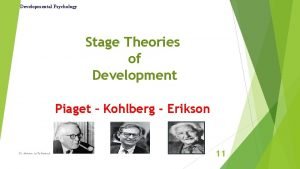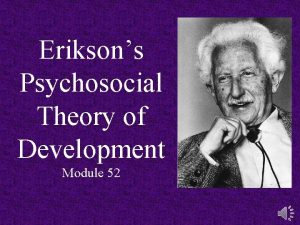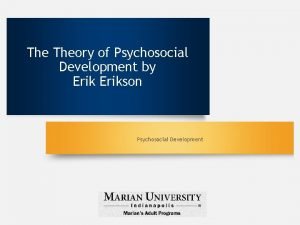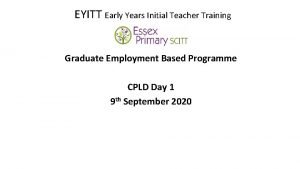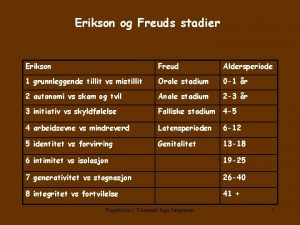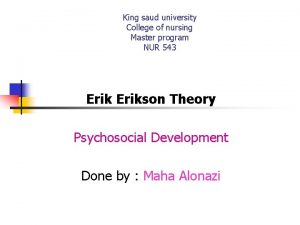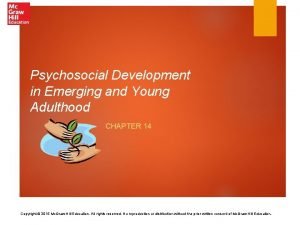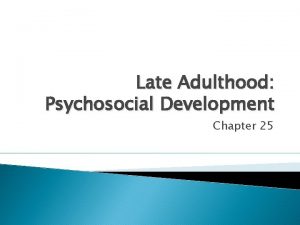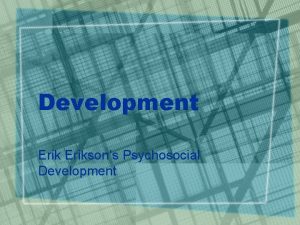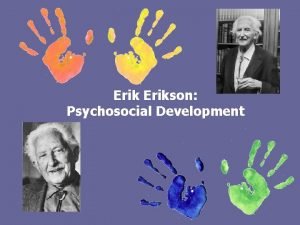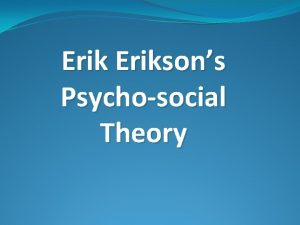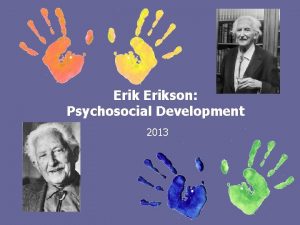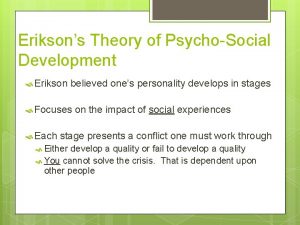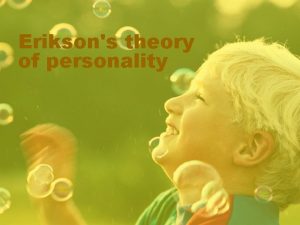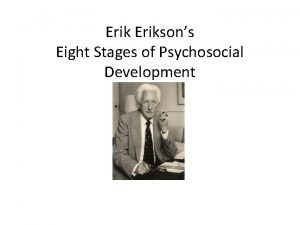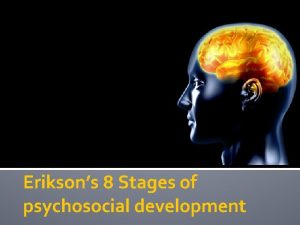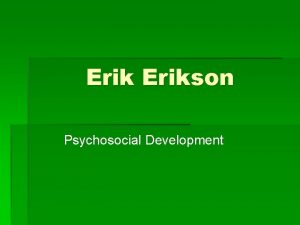Erikson Eriksons Psychosocial Theory of Human Development Overview












- Slides: 12

Erikson Erikson’s Psychosocial Theory of Human Development

Overview Life Each The is a series of stages. individual must pass through each stage. way in which a person handles each of these stages affects the person’s identity and self-concept.

What are the stages? Newborn – trust vs. mistrust Toddler – autonomy vs. shame and doubt Preschool – initiative vs. guilt School-age – Industry vs. inferiority Adolescent – identity vs. identity confusion Young adult – intimacy vs. isolation Adult – generativity vs. stagnation Elder – integrity vs. despair

1. Trust vs. Mistrust Age – Infancy (birth – 2 years) Important Event – Feeding Outcome -Children develop a sense of trust when caregivers provide reliability, care, and affection. A lack of this will lead to mistrust.

2. Autonomy vs. Shame and Doubt Age – Early Childhood (2 -3 years) Important Event – Toilet Training Outcome -Children need to develop a sense of personal control over physical skills and a sense of independence. Success leads to feelings of autonomy, failure results in feelings of shame and doubt.

3. Initiative vs. Guilt Age – Preschool (3 -5 years) Important Event – Exploration Outcome - Children need to begin asserting control and power over the environment. Success in this stage leads to a sense of purpose. Children who try to exert too much power experience disapproval, resulting in a sense of guilt.

4. Industry vs. Inferiority Age – School Age (6 -11 years) Important Event – School Outcome - Children need to cope with new social and academic demands. Success leads to a sense of competence, while failure results in feelings of inferiority.

5. Identity vs. Identity Confusion Age – Adolescence (12 -18 years) Important Event – Social Relationships Outcome - Teens need to develop a sense of self and personal identity. Success leads to an ability to stay true to yourself, while failure leads to role confusion and a weak sense of self.

6. Intimacy vs. Isolation Age –Young Adulthood (19 -40 years) Important Event – Relationships Outcome - Young adults need to form intimate, loving relationships with other people. Success leads to strong relationships, while failure results in loneliness and isolation.

7. Generativity vs. Stagnation Age – Middle Adulthood (40 – 65 years) Important Event – Work and Parenthood Outcome - Adults need to create or nurture things that will outlast them, often by having children or creating a positive change that benefits other people. Success leads to feelings of usefulness and accomplishment, while failure results in shallow involvement in the world.

8. Integrity vs. Despair Age – Elder (65 – death) Important Event – Reflection on Life Outcome - Older adults need to look back on life and feel a sense of fulfillment. Success at this stage leads to feelings of wisdom, while failure results in regret, bitterness, and despair.

Wrap Up What are the 8 stages of Human Development? What is the outcome of each?
 Psychology stages of development
Psychology stages of development Industry vs. inferiority
Industry vs. inferiority Trust vs. mistrust
Trust vs. mistrust Psychosocial stages
Psychosocial stages Erikson's industry vs inferiority
Erikson's industry vs inferiority Erikson's psychosocial crisis
Erikson's psychosocial crisis Erickson's psychosocial theory of development
Erickson's psychosocial theory of development Erikson stages of development
Erikson stages of development Eriksons behovspyramide
Eriksons behovspyramide Erikson's psychoanalytic theory of development
Erikson's psychoanalytic theory of development Infancy psychosocial development
Infancy psychosocial development Emerging adulthood psychosocial development
Emerging adulthood psychosocial development Late adulthood psychosocial development
Late adulthood psychosocial development
